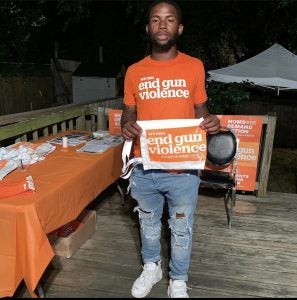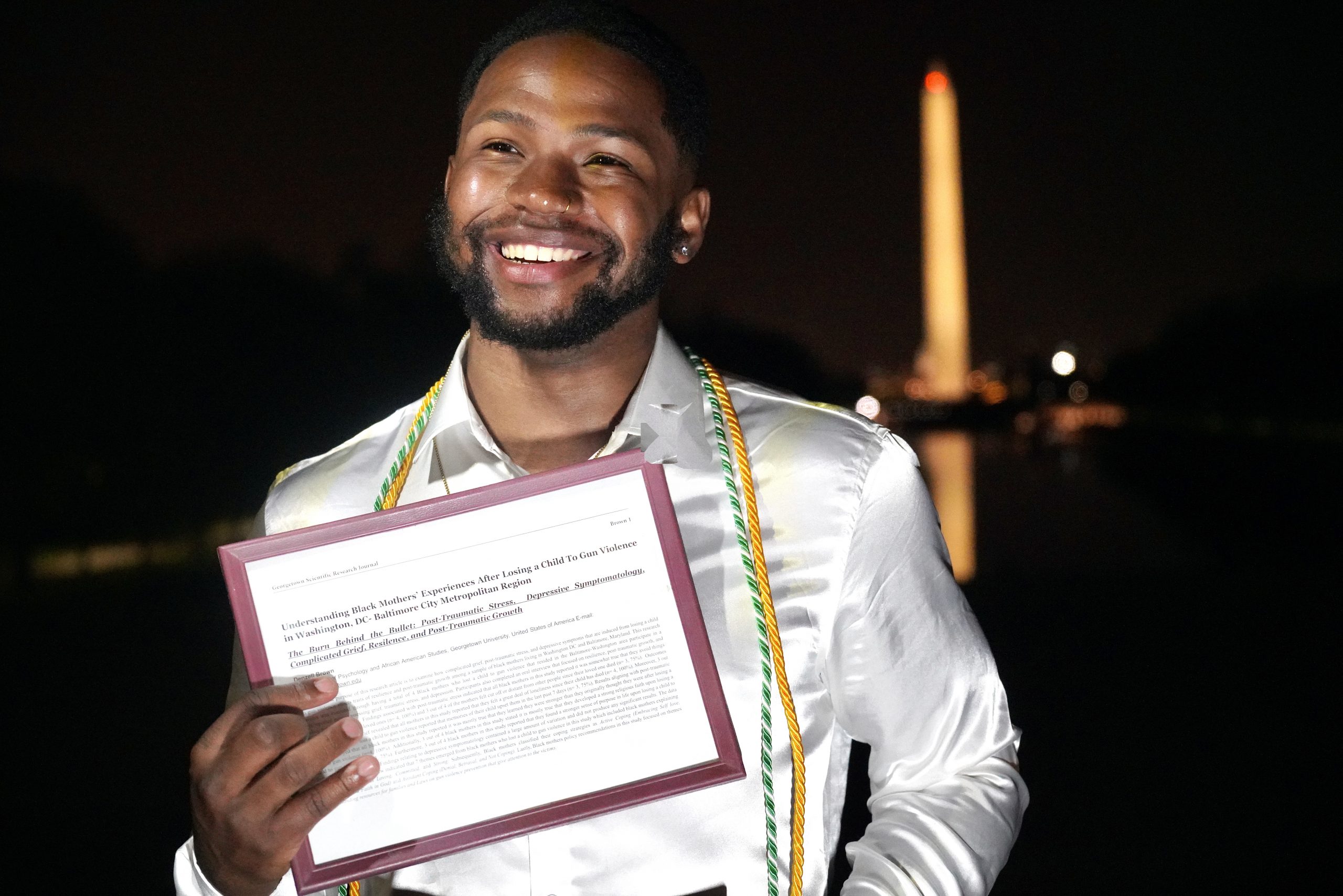Senior Advocates for Black Mothers Who Have Lost Children to Gun Violence
Psychology major Denzell Brown’s (C’21) research aims to provide aid to Black mothers who have lost children to gun violence in Washington, DC. The senior will continue to develop this project while he earns his PhD in counseling from Howard University so that he may improve the lives of Black mothers in the district.
“The reason I want to document and understand Black mothers’ experiences is because usually, when you hear about gun violence within the city, you hear about Black men being targets of it,” Brown says. “While this is true, a lot of people don’t talk about the trauma, depression, grief and turmoil that their mothers have to deal with in addition to the compounded stress of racism and sexism. It has a huge impact on them personally, but it also affects the resources they can access, and I want to change that.”
Making a Mentor
Growing up in DC, Brown was aware of the intergenerational effects of past gun violence, as well as the impact of current deaths caused by gun violence. He was particularly interested in the experiences of Black women who had lost a child to this in DC and how they were able to cope without access to proper resources.
“My interest in this really started off with me just being somebody who cared,” says Brown. “My initial goal was to validate the emotions of these mothers who were not being listened to or cared for by society or the greater DC community. Though my perspective as a man is limited, I still wanted to try and find a way to help.”

Brown attends anti-gun violence rally in 2019
After conducting independent research, Brown reached out to Anna Johnson, a professor in the Department of Psychology in his junior year. With the help of her mentorship, Brown was able to construct a mixed method study that involved surveys and interviews in order to answer his research questions.
Johnson says that when Brown approached her, she “could not pass the opportunity to mentor such a passionate and motivated young scholar.”
“Denzell is an outstanding scholar-in-training and community member who wants to use his research findings to inform social justice and policy initiatives to better serve this population,” Johnson says. “I have no doubt that Denzell, with his passion for conducting research and applying it to solve social problems, will do just that. He is humble, kind, smart and intellectually curious and is truly interested in making the world a better place.”
Taking Research Further
Brown interviewed four mothers in order to study the variable of post-traumatic growth as well as coping mechanisms exhibited by these individuals. He found that after undergoing this experience, many mothers reported that they had found a stronger religious faith, appreciation of life and personal fortitude.
During his analysis of the research, Brown realized that he could use the responses by the mothers to apply for grant funding that would help them and other mothers in similar situations.
“During their interviews, I asked the mothers what recommendations or what policy solutions would be helpful for those who have lost a child in this way, particularly Black mothers, and they answered that they would want access to therapy or access to legal advocacy help,” Brown says. “So I applied for a Davis Peace Fellows Grant using the mother’s proposed solutions, and it was accepted.”
Brown, who was also awarded the competitive Kalorama Undergraduate Research Fellowship for his research, used the Davis Fellows Grant to purchase therapy sessions and legal counsel for these mothers.
With the increased awareness around gun violence and police brutality in the past year, Brown says that an expansion of these resources is important now more than ever.
“What a lot of people don’t consider is that widely publicized acts of violence severely impact people who have already been through that experience,” Brown says. “That’s why this research is so important — we need to figure out the points of intervention, so we can stop the constant cycle of trauma and anxiety these mothers face. I feel like it’s the responsibility of people like me who are connected to Georgetown but also the DC community to try to leverage or create resources to alleviate some of the challenges that Black mothers face.”
Always An Advocate for Others
When Brown was not working on his research project, he competed on the Georgetown track team in the 100 and 200 meter sprints. Though he was an accomplished athlete, the senior says that his biggest reward was being able to mentor younger students.
“My biggest thing was being able to give light and knowledge to the incoming athletes,” Brown says. “When I got to Georgetown it was a big culture shock even though I was from DC, so I wanted to help others navigate and adjust to the school. I was really grateful that I could be there for people that were younger than me because it can be hard being a student-athlete at a place like Georgetown because you have to manage so many different opportunities and successes whether that’s on track or off the track.”
The senior was also accepted into Howard University’s doctoral counseling program. He hopes to focus on trauma and complicated grief and how these intersect with identities such as race, gender or sexual orientation. However, Brown says that now he has started his work with Black mothers in DC, he “can’t stop.”
This summer he is working on an initiative to align mothers with free therapy and legal counseling as a continuation of his undergraduate work. Brown will use the data he collected from his time at Georgetown in his doctoral program and may eventually incorporate it into his dissertation as well.
Ultimately, Brown hopes that this research can be used by the Attorney General’s Office or put within the Violence Alternative Prevention Program in DC so that a greater number of individuals who have been affected by gun violence can get the support they need.
“People tend to see these mothers as victims, when they are not victims at all and anyone engaging in this work should not treat them as such,” says Brown. “They are some of the most strong, powerful and loving people you will ever meet and we should look to them as sources of knowledge, hope and change.”
